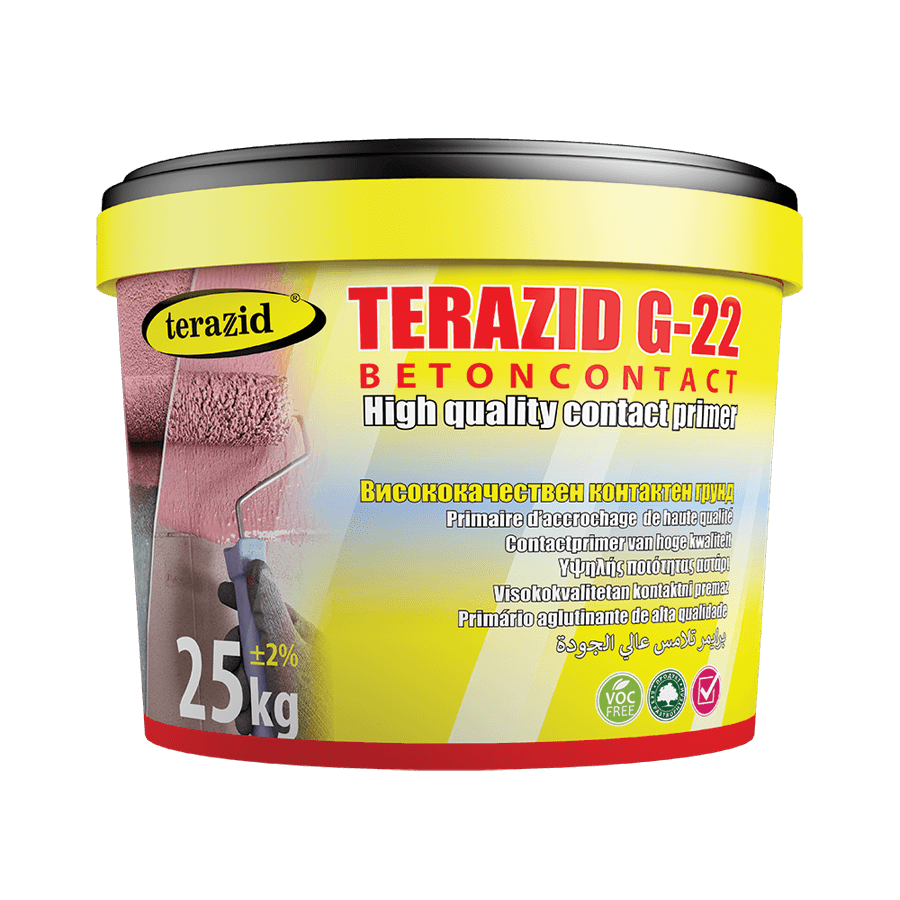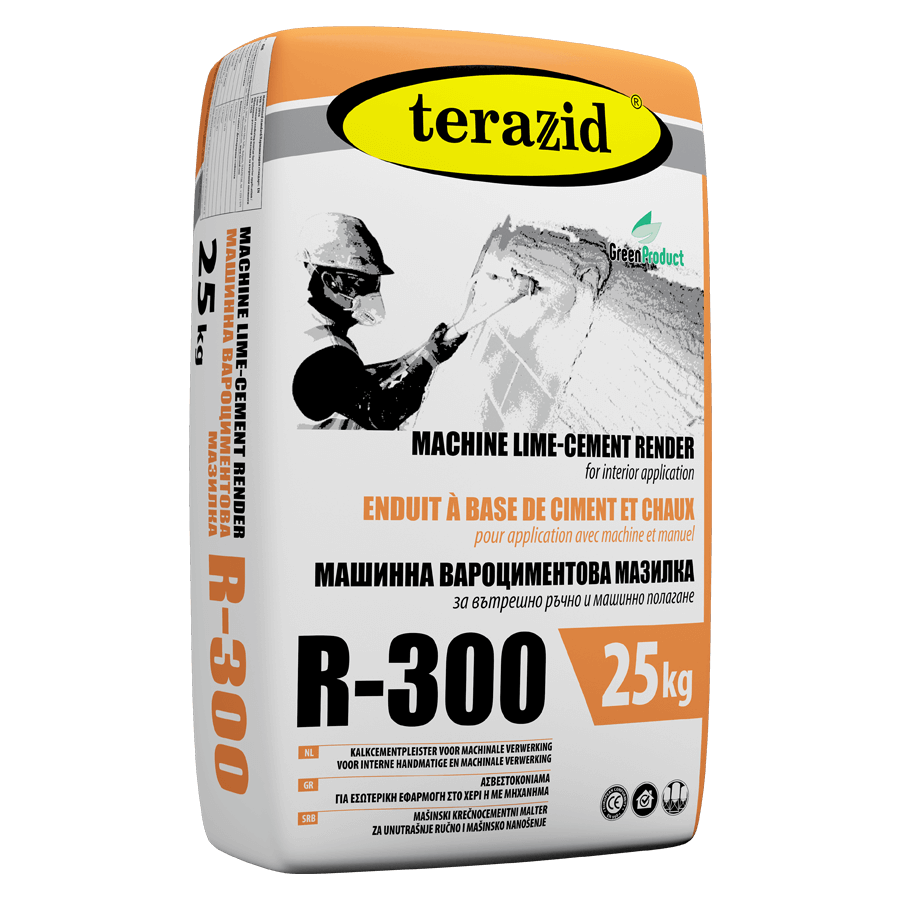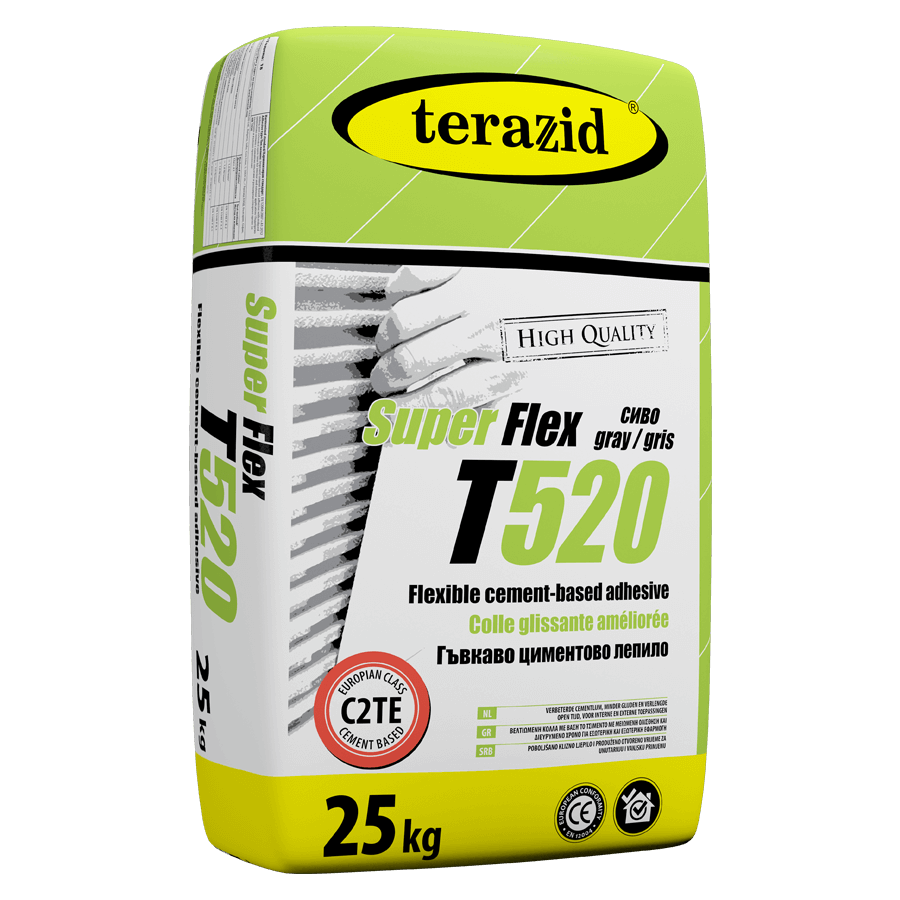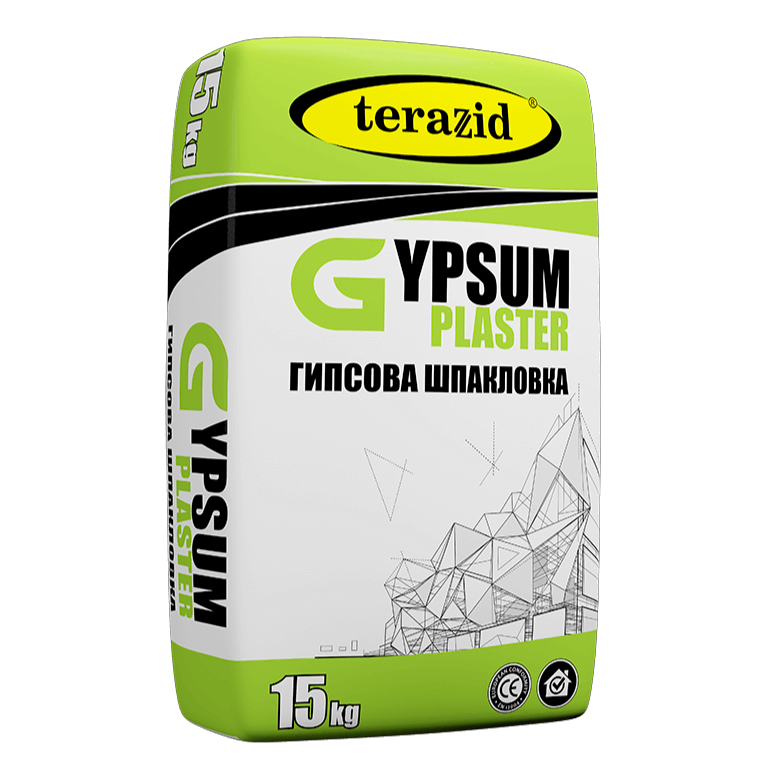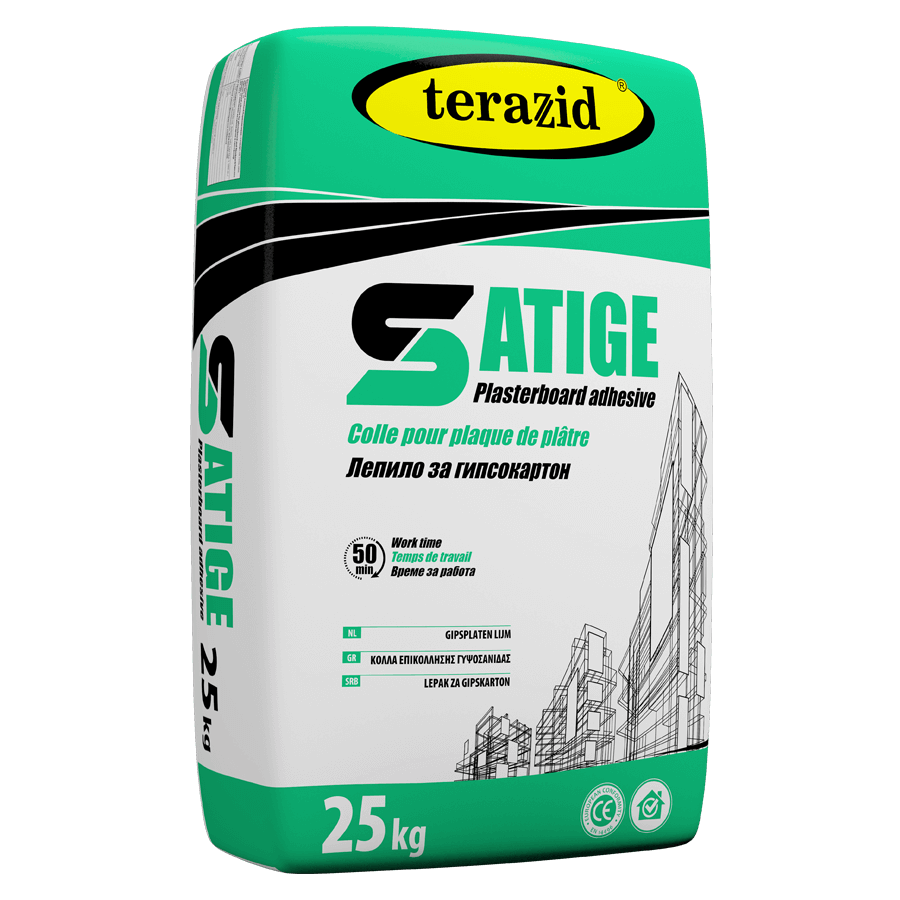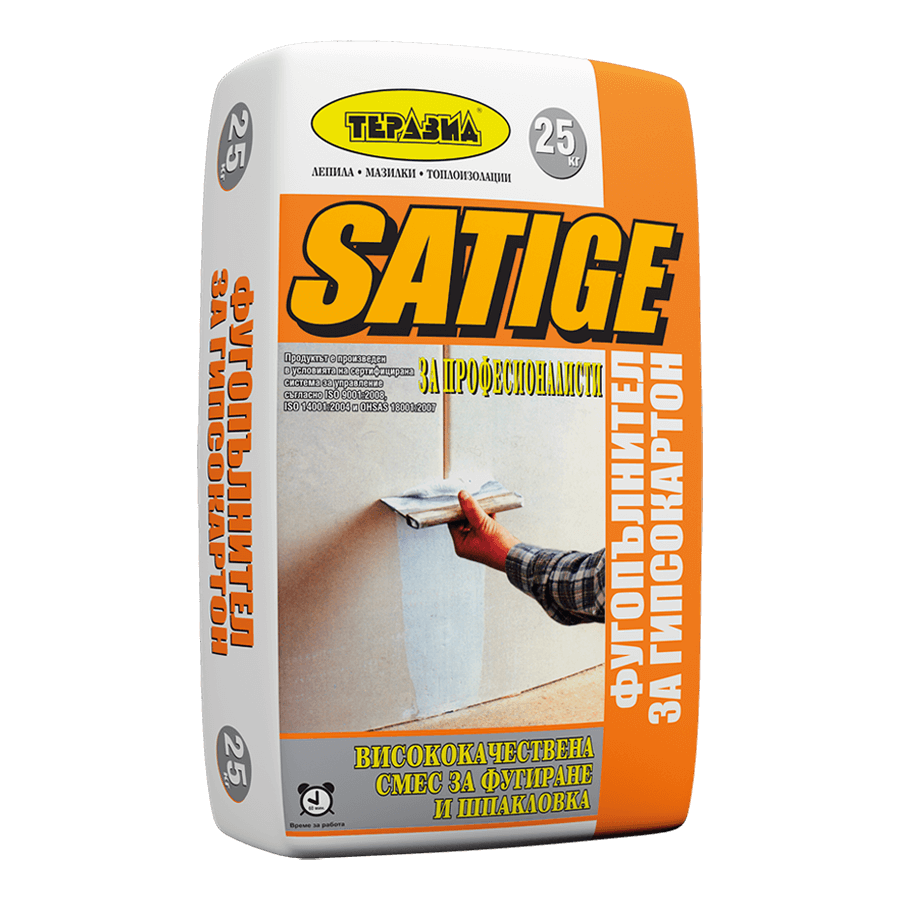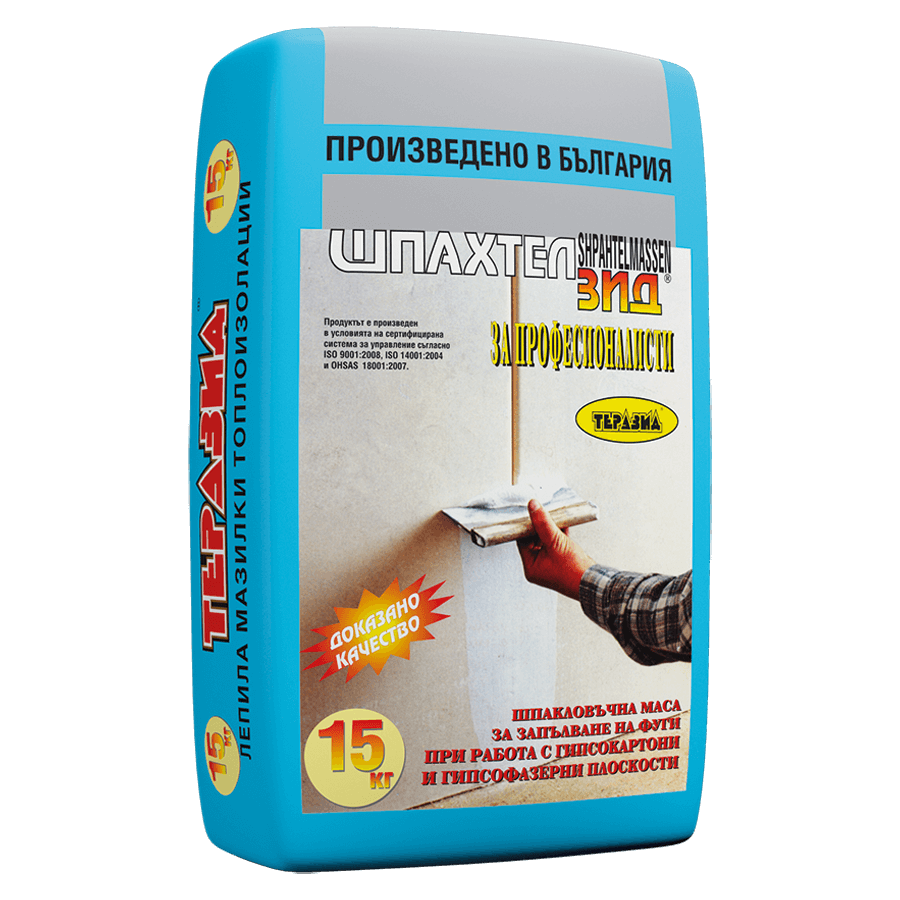Terazid G-22 Betoncontact – primer
According to EN 13300:2004
Contact primer for ensuring the bond between old substrates and new plasters and coverings
Category: Primers and impregnators
Description:
PURPOSE
TERAZID G-22 is a ready-to-work primer based on acrylic dispersion, with added polymers and fine quartz sand.
The product has extremely high adhesion to different types of substrates, which determines its application in many construction areas, such as:
• a contact layer, when bonding ceramic or stone tiles over old existing tiles, with the TERAZID’s flexible adhesives
• a contact layer, when bonding gypsum plasterboards on brick masonries or concrete walls, with SATIGE Adhesive for gypsum plasterboard
• a contact layer, when applying lime-cement, gypsum or polymer plasters on smooth concrete surfaces
Declaration of Product Characteristics
Terazid G-22 Betoncontact – primer
Declaration of Product Characteristics
DECLARATION OF PRODUCT CHARACTERISTICS
According with Regulation (BG) RD-02-20-1/2015
TERAZID G-22 (BETONCONTACT)
№ 20130709-55-D
1. Unique identification code of product type:
TERAZID G-22 BETONCONTACT
2. National requirements (Minister of Regional Development and Public Works, national regulation) technical specification (national standard, Bulgarian technical approval) applicable to the construction product:
-
BDS EN 1062-1 — Paints and varnishes — Coating materials and coating systems for exterior masonry and concrete — Part 1: Classification
3. Intended use or uses of the construction product in accordance with the national requirements, as foreseen by the manufacturer:
Contact primer for ensuring the bond between old substrates and new plasters and coverings.
4. Name, registered trade name or registered trademark, and contact address of the manufacturer:
TERAZID Ltd.
5 „5004” Str., Gara Iskar, Sofia 1528, Bulgaria
Tel.: +359 2 979 9971
E-mail: office@terazid.com
5. Where applicable, name and contact address of the authorised representative:
Not applicable.
6. Where applicable, name and contact address of the notified body to assess compliance with national requirements:
1950 – The Research Institute of Building Materials (NIISM), Sofia, Bulgaria
Test protocol № 1057/29.11.2007
7. Declared performance:
| Characteristics | Performance | Test method |
|---|---|---|
| Density | 1.750 g/cm³ | BDS EN ISO 2811-1 |
| Adhesion with the base | 0.60 N/mm² | BDS EN ISO 4624 |
| Coefficient of capillary absorption of water – w | 0.41 kg/m²·h0.5 | BDS EN 1062-3 |
| pH at 20°C | 6.5 | BDS EN ISO 787-9 |
| Content of volatile organic compounds /VOC/ | 0.1 g/l | BDS EN ISO 11890-2 |
8. The characteristics of the product identified in point 1 are in conformity with the declared performance in point 7.
This declaration of performance is issued under the sole responsibility of the manufacturer identified in point 4, or the authorised representative identified in point 5.
Technical Data Sheet (TDS)
Terazid G-22 Betoncontact – primer
Technical Data Sheet (TDS)
TECHNICAL DATA SHEET TERAZID
G-22 (BETONCONTACT)
Contact Primer
High-quality contact primer for ensuring the bond between old substrates and new plasters and coverings
PURPOSE
TERAZID G-22 is a ready-to-use primer based on acrylic dispersion with added polymers and fine quartz sand.
The primer is widely used in various construction and repair activities, such as:
-
As a bonding layer when fixing ceramic and terracotta tiles over old tiles using the adhesive SUPER FLEX T520
-
As a bonding layer when fixing gypsum boards to brick, concrete, and other wall types using SATIGE
-
Preparation of smooth concrete surfaces before applying gypsum, lime-cement, and polymer plasters
-
As a base for non-absorbing plasters
PROPERTIES
-
Ready for use
-
Increases adhesion
-
Strengthens the base
PREPARATION OF THE BASE
TERAZID G-22 can be applied equally well to various types of old and smooth surfaces, including:
-
Water-absorbing bases (concrete, plasters, cement coatings, etc.)
-
Non-absorbing bases (old ceramic facings and similar surfaces)
The base must be dry, strong, and free of grease and dust.
CHARACTERISTICS AND TECHNICAL DATA
-
Colour: Pink
-
Base: Acrylic dispersion
-
Density: 1.750 g/cm³
-
Operating time: 24 hours
-
Work temperature: +5°C to +30°C
-
Content of non-volatile substances: 71.63%
-
Adhesion with concrete: 0.60 N/mm²
APPLICATION AND PROCESSING
Before use, stir the product thoroughly with a mechanical stirrer without any dilution.
Apply TERAZID G-22 in one even layer using a roller brush with smooth movements.
CONSUMPTION
-
From 0.250 kg/m² to 0.350 kg/m², depending on the flatness and texture of the base.
TOOLS FOR WORK
-
Electrical drill and stirrer
-
Roller-brush
-
Brush
WEATHER CONDITIONS AT WORK
The minimum 24-hour temperature of the air and base should not be lower than +5°C, and the maximum should not exceed +30°C.
FORM OF DELIVERY
-
Liquid in plastic buckets of 1.4 kg, 5 kg, and 25 kg.
NOTES
-
Characteristics and technical data presented in this Technical Data Sheet are defined at a standard temperature of 20°C and a relative humidity of 50%.
In other weather conditions, the technological times for some processes may vary. -
The product information is based on the manufacturer’s practical experience and technical tests in specialized laboratories.
-
Do not mix with other building materials.
-
All hazard and precautionary statements about TERAZID G-22 can be found in the product’s Safety Data Sheet.
STORAGE
-
Shelf life: 12 months in originally sealed packages
-
Storage conditions: Store at temperatures between +5°C and +30°C.
Protect from freezing and direct sunlight.
| TERAZID Ltd. | ||
| 5 “5004” Str. Gara Iskar, Sofia, Bulgaria | ||
| Test Protocol №: 1057/29.11.2007 | ||
| NB 1950 | ||
| DoP № 20130709-55-D | ||
| TERAZID G-22 (BETONCONTACT) | ||
| High-quality contact primer | ||
| Density | 1.750 g/cm³ | |
| Adhesion with the base | 0.60 N/mm² | |
| Content of volatile organic compounds /VOC/ | 0.1 g/l < 30 g/l | |
| pH at 20°C | 6.5 | |
| Coefficient of capillary absorption of water – w | 0.41 kg/m²·h0.5 | |
The manufacturer recommends checking the suitability of the product in the Technical Data Sheet. The same is responsible for the product quality, but not for the ways and conditions of its applying. The information into the present Technical Data Sheet is reliable but only if the product is used under stated conditions. The responsibility of any other usage of the product, including its usage in a combination with any other product or a process, is borne by the user.
Material Safety Data Sheet (MSDS)
Terazid G-22 Betoncontact – primer
Material Safety Data Sheet (MSDS)
MATERIAL SAFETY DATA SHEET
According to (EU) 830/2015
TERAZID G-22 (BETONCONTACT)
1. Identification of the Substance/Mixture and of the Company
1.1. Product identifier – TERAZID G-22 (BETONCONTACT) 1.2. Application of the substance Contact primer for ensuring the bond between old substrates and new plasters and coverings. 1.3. Details of the supplier of the safety data sheet TERAZID Ltd. 5, 5004 Street, Gara Iskar 1528 Sofia, Bulgaria tel. +3592/9799971, office@terazid.com 1.4. Emergency telephone number 112 UMHATEM “Pirogov” (toxicology) – +3592/9154409; +3592/9154233
2. Hazards Identification
2.1. Classification of the substance or mixture – Classification in accordance with the Regulation (ЕО) 1272/2008 – CLP The product is not classified as „dangerous“. 2.2. Label elements Precautionary statements: P101 – If medical advice is needed, have product container or label at hand. P102 – Keep out of reach of children. P262 – Do not get in eyes, on skin, or on clothing. P305 + P351 + P313 – IF IN EYES: Rinse cautiously with water for several minutes. Get medical advice/attention. P280 – Wear protective gloves/protective clothing/eye protection/face protection. P301 + P311 – IF SWALLOWED: Call a POISON CENTER or doctor/physician. P410 – Protect from sunlight. P401 – Store at temperatures higher than +5°C. 2.3. Other hazards None. For all warnings and recommendations, see Section 15.
3. Composition/information on ingredients
General chemical description – Acrylic-polymer dispersion with added polymers and fine quartz sand. Information of the substances in accordance with CLP 1272/2008/EC Does not contain products, presenting in this section.
4. First Aid Measures
4.1. Description of the first aid measures Inhalation – Remove the person to fresh air. If the symptoms continue, immediately seek for qualified medical help. Skin contact – Immediately rinse the area of the contact with plenty of water, then wash it thoroughly with soap and water. Eye contact – Rinse with plenty of water for a period of at least 15 minutes and open eyelid. Seek for qualified medical help. Ingestion – Wash the mouth and the throat. Drink plenty of water. Seek for qualified medical help. 4.2. Most important symptoms and effects, both acute and delayed None. 4.3. Indication of any immediate medical attention and special treatment needed – see p. 4.1.
5. Firefighting Measures
TERAZID G-22 is non-combustible and prevents flames from spreading. Does not support combustion of other products. 5.1. Extinguishing media Water mist, water spray – sprayer, dry chemical, foam, carbon dioxide. Inappropriate extinguishing media – water under pressure. 5.2. Special hazards, arising from the substance or mixture – Non known 5.3. Advice for firefighters – Standard protective equipment when extinguishing a fire.
6. Accidental Release Measures
6.1. Personal precautions, protective equipment and emergency procedures Gloves, masks, protective clothing for work. Contact with skin and eyes should be avoided. 6.2. Environmental precautions Prevent this product from release in the environment. Measures should be taken for preventing contamination of surface and underground watercourses, soil, as well as falling into the drains. In the event of an accident and/or spill of the product, measures for localization and limitation should be taken, and the collected amount of the product should be temporarily stored into a special, tightly closed and labeled containers, and after that they should be transferred to people, holding permits under the Article 37 of the Waste Management Act (publication SG, issue 53, 2012). 6.3. Methods and materials for containment and cleaning up The spilled amount should be mechanically removed, and then the place should be washed thoroughly with water in accordance with the measures under art.6.2. Collected amount should be stored in special, tightly closed and labeled containers and to be temporarily stored on the territory of the company, and after that they should be transferred to people, holding a permit under the Waste Management Act (WMA).
7. Handling and Storage
7.1. Precautions for safe handling The product should be used only according to its main purpose. Avoid skin and eye contact. Keep the package tightly closed after usage. 7.2. Conditions for safe storage, including any incompatibilities It should be stored in ventilated and dry places, into the originally sealed containers. Temperatures lower than +5C and higher than +40C should be avoided. It should be separately stored from food and drinks. 7.3. Specific Usage There is no specific usage. It should be used only according to its main purpose.
8. Exposure Controls/Personal Protection
8.1. Control parameters – No special protection measures are necessary. 8.2. Exposure controls 8.2.1. Respiratory protection – prolonged inhalation of fumes should be avoided. 8.2.2. Skin protection – skin contact should be avoided, wear protective gloves. Clothing, soaked with the product should be changed. 8.2.3. Eye protection – eye contact should be avoided, wear safety glasses. 8.2.4. Common protection – it should be stored away from food, drinks and food for animals.
9. Physical and Chemical Properties
9.1. Information on basic physical and chemical properties
-
Appearance: Liquid material
-
Colour: Pink
-
Odour: Light
-
pH at 20°C: 6.5
-
Density: 1750 kg/m³
-
Solubility: Partial
-
Explosive properties: Non-explosive
9.2. Other information – no data.
10. Stability and reactivity
10.1. Reactivity – no hazardous reactions. 10.2. Chemical stability – the product is stable under storage and usage in accordance with the indications. 10.3. Possibility of hazardous reactions – in accordance with section 10.1. 10.4. Conditions to avoid – temperatures lower than +5C and higher than 40C should be avoided. 10.5. Incompatible materials – no data. 10.6. Hazardous decomposition products – it is unlikely to release carbon oxides at fire.
11. Toxicological information
11.1. Information for the toxicological effects Toxicological properties of the product are not tested. The product is classified under the conventional method in accordance with Regulation (ЕО) 1272/2008 – CLP. On the basis of its composition, the product can be defined as not having any toxic effects under a proper usage. Ingestion – The product is not hazardous of acute poisoning. Inhalation – It is not considered as harmful at normal conditions. Skin contact – Prolonged contact may cause irritation. Eye contact – Prolonged and repeated contact may cause irritation and redness.
12. Ecological information
12.1. Toxicity Polymer dispersion data: Toxicity to fish: LC50 (96 h) > 100 mg/l, (OECD Directive 203, static) Aquatic invertebrates: ЕC50 (48 h) > 100 mg/l, (OECD Directive 202, part 1, static) Aquatic plants: ЕC50 (72 h) > 100 mg/l, (OECD Directive 201) Micro-organisms/Effect of the active sediment: ЕC20 (0,5 h) > 100 mg/l, active sediment (DIN EN ISO 8192-OECD 209-88/302/EEC, P. C) On the basis of the experience, the product is not expected to be hazardous to the environment. 12.2. Persistence and degradability – No data. 12.3. Bio-accumulative potential – Accumulation in the organism is not expected. 12.4. Mobility in soil This product is not biologically mobile. 12.5. Results of PBT and vPvB assessment – the product meets the criteria of PBT (persistent, bio-accumulative and toxic) and vPvB (very persistent and very bio-accumulative). 12.6. Other adverse effects No data. General information: Do not allow the product to enter into the soil or natural watercourses.
13. Disposal considerations
Product waste, such as residual quantities and packages, should be collected into a special, tightly sealed and labelled containers, temporarily stored, and after that to be transferred to people, holding a permit in accordance with article 37 of the Waste Management Act (publication SG, issue 53, 2012). Waste code, in accordance with Regulation №2 from 23.07.2014 for Waste Classification: 08 01 20 – liquid suspensions of paints, others than those mentioned in 08 01 19 Waste Packages code: 15 01 02 – plastic packages. Completely empty the packages and dispose them in accordance with the local regulations.
14. Transport information
It is not a hazardous load, in accordance with RID, ADR, ADNR, IMDG, IATA-DGR. It should be transported under the respective rules for transportation, concerning the respective type of transport and ensuring the safety of the load.
15. Regulatory information
15.1 Content of volatile organic compounds /VOC/, in accordance with the Ordinance on limiting the emissions of volatile organic compounds in the use of organic solvents in certain paints, varnishes and auto reparatory products, category А, sub point c) 0.1 g/l < 30 g/l 15.2 Classification and labelling of the product in accordance with Regulation (ЕО) 1272/2008 – CLP /full text of the codes/ GHS Pictograms: No. Signal word: No. Recommendations for danger (N – codes): None. Hazard statements (H – codes): None. Precautionary statements (P – codes): P101 – If medical advice is needed, have product container or label at hand. P102 – Keep out of reach of children. P262 – Do not get in eyes, on skin, or on clothing. P305 + P351 + P313 – IF IN EYES: Rinse cautiously with water for several minutes. Get medical advice/attention. P280 – Wear protective gloves/protective clothing/eye protection/face protection. P301 + P311 – IF SWALLOWED: Call a POISON CENTER or doctor/physician. P410 – Protect from sunlight. P401 – Store at temperatures higher than +5°C.
15.3. LEGISLATION
National Legislation:
-
Law of Protection from the Harmful Impact of the Chemical Substances and Preparations
-
Environmental Protection Law
-
Health and Safety at Work Act
-
Ordinance №3 on the Minimum Requirements for Safety and Protection of Workers When Using Personal Protective Equipment at the Workplace
-
Waste Management Act
-
Ordinance №2 from 23.07.2014 for Waste Classification
-
Ordinance on the Order and Method of Classification, Labelling, and Packaging of Chemical Substances and Preparations
European Legislation:
-
Regulation (EC) 1272/2008 – CLP from 16th December 2008, concerning the classification, labelling, and packaging of substances and preparations
-
Regulation (EU) 830/2015 from 28th May 2015
16. Other Information
16.1. Indication of changes Format in accordance with Regulation (ЕО) 830/2015 from 28th May 2015 amending Regulation № 1907/2006 (REACH) of the European Parliament. 16.2. Training Advice In addition to the training programs on environment and health and safety of the workers, the companies need to be sure that their workers read, understand and apply the requirements of the MSDS. 16.3. Additional information See the application(s) of exposure scenarios for the following substances: The basic information of the exposure scenarios of the substances in the mixture are included in points 1, 2, 3, 8, 11 and 12.
16.4. Disclaimer
This safety data sheet and the data inside of it are based on industrial and commercial experience of many years and are fully complied with the current active legislation of the Republic of Bulgaria and the European Union. This safety data sheet is not intended to guarantee any specific properties and qualities of the product. The information inside of it is reliable but, on the circumstance, that the product is used in accordance with the indicated conditions and the application, specified on the package and/or in the technical literature. Responsibility of any other use of the product, including when using it in combination with another product or process is completely under the responsibility of the user. It is understood that the user is responsible for defining the appropriate precautions and for applying the legislation, concerning his own activity.
Technical Data
| Time for drying | 24 h. |
| Adhesion with the base | 0,60 N/mm² |
| pH | 6,5 |
| Consumption | from 0.250 kg/m² to 0.350 kg/m² |
| Package | 1.4 kg (0.9 l) | 5 kg (3.2 l) | 25 kg (18 l) |
| Price | see price list | see price list | see price list |
| Pieces | 200 pcs/pallet | 80 pcs/pallet | 24 pcs/pallet |
Related Products
Cement based mixtures
Adhesives for ceramic and stone floorings and coverings
Gypsum based mixtures
Gypsum based mixtures
Gypsum based mixtures
Gypsum based mixtures
